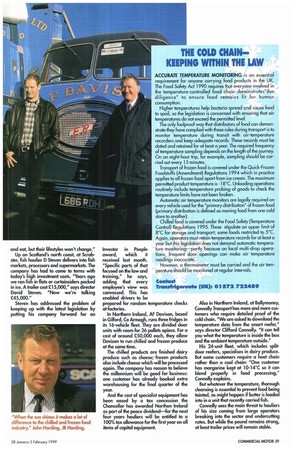THE COLD CHAIN KEEPING WITHIN THE LAW
Page 41

If you've noticed an error in this article please click here to report it so we can fix it.
ACCURATE TEMPERATURE MONITORING is an essential requirement for anyone carrying food products in the UK, The Food Safety Act 1990 requires that everyone involved in the temperature-controlled food chain demonstrates"due diligence" to ensure food remains fit for human consumption. Higher temperatures help bacteria spread and cause food to spoil, so the legislation is concerned with ensuring that air temperatures do not exceed the permitted level. The only foolproof way that distributors of food can demonstrate they have complied with these rules during transport is to monitor temperature during transit with air-temperature recorders and keep adequate records. These records must be dated and retained For at least a year. The required frequency of temperature sampling depends on the length of the journey. On an eight-hour trip, for example, sampling should be carried out every 15 minutes. Transport of frozen food is covered under the Quick-Frozen Foodstuffs (Amendment) Regulations 1994 which in practice applies to all frozen Food apart from ice cream. The maximum permitted product temperature is -18°C. Unloading operations routinely include temperature probing of goods to check the temperature limits have not been broken. Automatic air temperature monitors are legally required on every vehicle used for the "primary distribution" of frozen food (primary distribution is defined as moving food from one cold store to another).
Chilled food is covered under the Food Safety (Temperature Control) Regulations 1995. These stipulate an upper limit of 8°C for storage and transport; some foods restricted to 5°C. Again, operators must retain temperature records for at least a year but this legislation does not demand automatic temperature monitoring—partly because on local multi-drop operations, frequent door openings can make air temperature readings inaccurate. However, a thermometer must be carried and the air temperature should be monitored at regular intervals.








































































































